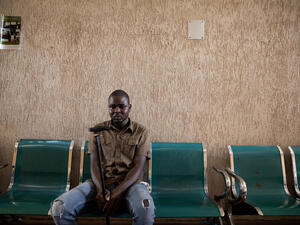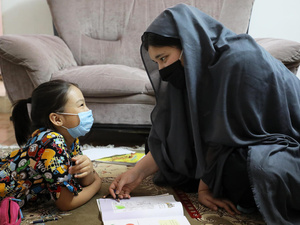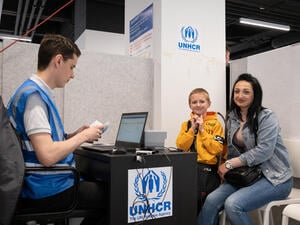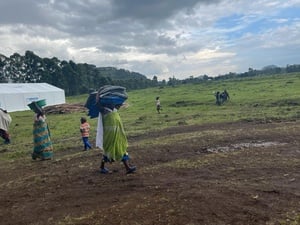Inner city evictions leave Johannesburg refugees and asylum seekers homeless
Inner city evictions leave Johannesburg refugees and asylum seekers homeless
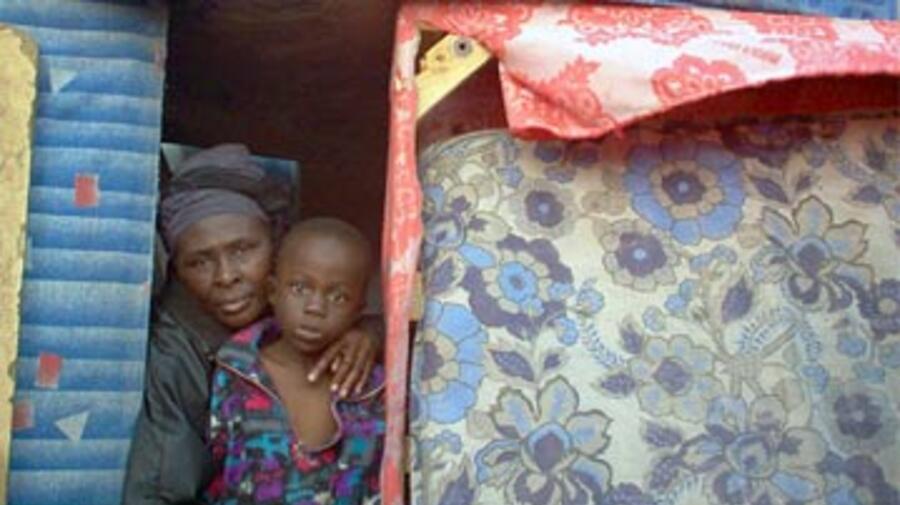
A mother and child among the refugees and asylum seekers who were evicted from the building in Johannesburg where they were living and are now on the street while efforts are made to find new accommodation.
JOHANNESBURG, South Africa, April 11 (UNHCR) - Johannesburg's inner city regeneration programme has led to the eviction of more than 100 refugees and asylum seekers, their belongings now piled on the pavement surrounding the Coronia Gardens apartment block that had been home to many of them for years.
Congolese refugee Agnes Bahombi puts on a brave face as she chats playfully with her 10-year-old son. He has cerebral palsy and, for once, she is happy he doesn't understand why their family is living outside their former home.
The cold grey morning mirrors her thoughts as she racks her brain for a solution. With four other children playing somewhere on the streets, she does not dare leave her remaining property unattended. She cannot rely on anyone to care for her son, so she cannot go to the area of the city where she worked as a hawker. Without the ability to generate income and with food sources dwindling, she and her family could be in for very bleak days.
While she tells her story, she looks longingly at the building that is now surrounded by security guards to prevent anyone reoccupying it. The regeneration scheme was launched in 1997 in hopes of revamping derelict buildings for sound business and residential purposes.
A legal decision in March 2006 stopping eviction of some of Johannesburg's poorest residents from such buildings without providing adequate alternative shelter was recently set aside by South Africa's Supreme Court of Appeal (SCA). It ruled that the city council was not obliged to provide housing within the inner city, where most refugees work and reside.
According to news reports, SCA Judge Louis Harmse found there was no constitutional obligation on the state to provide housing in a particular area but added that the city did have a legal obligation to "provide at least minimum shelter."
Stuart Wilson of the Wits Centre for Legal Studies, which advocates for the rights and needs of poor people in the inner city, agrees with that obligation: "Though they cannot be provided with accommodation at a locality of their choice, they should not be evicted without alternative accommodation."
Unfortunately, in this instance the needs of Bahombi and other refugees and asylum seekers appear to have been overlooked. At three in the morning on March 28, the Johannesburg Metro Police and the Red Ants, a removals company, proceeded to evict them.
They have spent more than a week on the pavement braving the approaching winter in makeshift shelters assembled from sagging mattresses and whatever they could salvage from their apartments and off the streets.
During UNHCR's Age, Gender and Diversity Mainstreaming exercise in major South African cities in August and September last year, the magnitude of the problem of accommodation for refugees became all too apparent. Coronia Gardens, a 13-storey apartment block originally housing some 500 refugees, is an example of accommodation that refugees can afford.
The stench from burst sewage pipes prevents entry unless one has no option. Broken doors and windows - even walls - testify to years without maintenance. With no lifts or electricity, it is a hunting ground of criminals who conduct their business unhindered, exposing refugees - particularly women and children - to physical abuse and possible sexual exploitation.
"At least then we could take shelter in a four-walled structure," says Pastor Ibrahim Ilunga, the spiritual authority among the evictees. "Today it is cold, tomorrow it rains, on a third night we are harassed. Children are falling ill. What must we do?"
Amid refugee complaints that the City of Johannesburg is not caring for their welfare, UNHCR's implementing partner, the Jesuit Refugee Services (JRS), is trying to arrange a short-term solution with relevant organisations and shelters. "At present we are assessing the situation so that we can present our findings to the relevant government departments and to UNHCR for assistance," says Blaise Nzuzi, JRS Health Officer.
While UNHCR has increased its emergency assistance budget by 10 percent, it has also advised its implementing partner to examine working with local disaster authorities to advocate for including refugees in solutions devised for South Africans. JRS has also been encouraged to explore possible support from government such as the Department of Social Development's Refugee Relief Board.
Speedily resolving the situation is critical. With winter fast approaching it is imperative that some provision of shelter is available to refugees and asylum seekers alongside their South African counterparts. It is feared the court ruling will trigger a flurry of evictions in coming months that could see 70,000 people, including refugees and asylum seekers, expelled from 235 buildings.
By Pumla Rulashe in Johannesburg, South Africa


